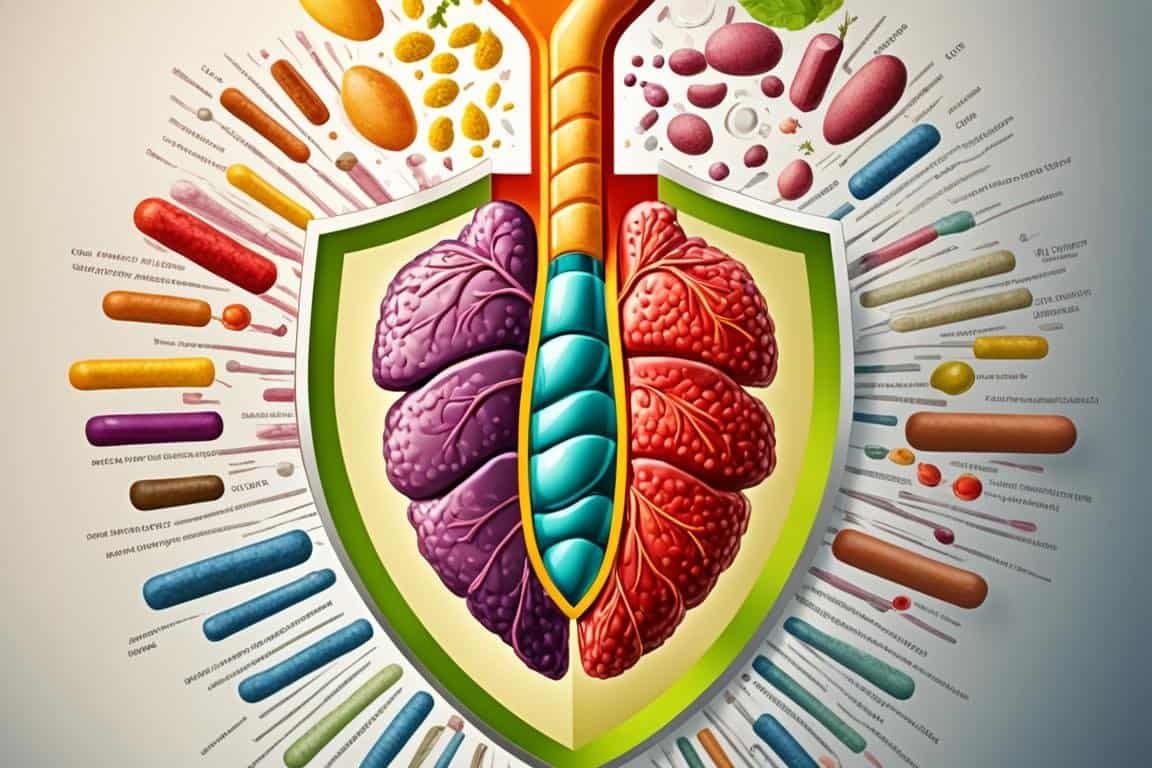When you have liver disease and need to lower your cholesterol, it is important to take steps to manage both conditions safely. Your liver plays a crucial role in cholesterol production and clearance in the body. If your liver is unable to function properly, it can lead to an increase in cholesterol levels, which can have negative effects on your health. Taking preventive measures, such as adopting a cholesterol-lowering diet and making lifestyle changes, can help protect your liver and manage your cholesterol levels effectively.
Key Takeaways:
- Managing liver disease and cholesterol requires a comprehensive approach.
- Adopting a cholesterol-lowering diet can help protect your liver and manage cholesterol levels.
- Lifestyle changes, such as regular exercise, are crucial for liver health and cholesterol management.
- In some cases, medication may be prescribed to effectively lower cholesterol levels.
- Consult with your healthcare professional for personalized recommendations and guidance.
The Role of the Liver in Cholesterol Management
The liver plays a crucial role in managing cholesterol levels in your body. It is responsible for both the production and clearance of cholesterol, ensuring a healthy balance. Let’s delve into the specific functions of the liver in cholesterol management.
The liver produces cholesterol and releases it into the bloodstream through lipoproteins. These lipoproteins act as carriers, transporting cholesterol and other lipids throughout your body. They ensure that cholesterol reaches the cells that need it for various important functions.
Furthermore, the liver plays a vital role in cholesterol clearance. It removes excess cholesterol from your body through bile, a fluid produced by the liver and stored in the gallbladder. Bile helps eliminate cholesterol from your body, maintaining a healthy cholesterol balance.
However, if your liver is unable to keep up with the clearance of cholesterol or if there is an imbalance in its production and clearance, it can lead to elevated cholesterol levels. High cholesterol levels pose risks to your health, such as the development of fatty liver disease and nonalcoholic steatohepatitis (NASH). To prevent such complications, it is essential to support your liver health and maintain proper cholesterol management.
Diet and Lifestyle Changes for Liver Health and Cholesterol Management
Adopting a healthy diet and making lifestyle changes can have a significant impact on your liver health and help you manage your cholesterol levels effectively. One highly recommended diet for promoting liver health is the Mediterranean diet.
The Mediterranean diet emphasizes the consumption of:
- Fruits and vegetables – These provide essential vitamins, minerals, and antioxidants that support liver function and overall health.
- Whole grains – Opting for whole grain foods such as brown rice, whole wheat bread, and quinoa can help regulate cholesterol levels.
- Legumes – Beans, lentils, and chickpeas are rich in fiber and plant-based proteins, contributing to lower cholesterol levels.
- Nuts and seeds – Almonds, walnuts, flaxseeds, and chia seeds are sources of heart-healthy fats that can aid in reducing cholesterol.
- Olive oil – Replace unhealthy fats with olive oil, a key component of the Mediterranean diet that has been shown to benefit liver health.
Additionally, engaging in regular exercise is crucial for maintaining liver health and managing cholesterol levels. Physical activity helps with weight management and improves liver function. It also promotes the production of high-density lipoproteins (HDL), which are considered “good” cholesterol and help remove low-density lipoproteins (LDL), or “bad” cholesterol, from the bloodstream.
By combining a cholesterol-lowering diet rich in fruits, vegetables, whole grains, beans, nuts and seeds, and olive oil with regular exercise, you can positively influence both your liver health and cholesterol management.

Sample Mediterranean Diet Meal Plan
| Meal | Food Choices |
|---|---|
| Breakfast | Vegetable omelet with whole wheat toast and a side of berries |
| Lunch | Salad with mixed greens, grilled chicken, cherry tomatoes, cucumbers, and a drizzle of olive oil dressing |
| Snack | Handful of almonds and a piece of fruit |
| Dinner | Baked salmon with roasted vegetables and quinoa |
| Snack | Greek yogurt with a sprinkling of flaxseeds |
Medications for Liver Disease and Cholesterol Management
In some cases, lifestyle changes alone may not be enough to effectively lower cholesterol levels when you have liver disease. In such situations, your doctor may prescribe a cholesterol-lowering medication. The most commonly prescribed medication for lowering cholesterol levels is statins.
Statins work by blocking a chemical in the liver that produces cholesterol. By inhibiting this enzyme, statins reduce the amount of cholesterol circulating in the bloodstream, helping to lower cholesterol levels and reduce the risk of cardiovascular disease.
It is important to consult your doctor before starting any medication to ensure it is safe for your liver condition and to determine the appropriate dosage. Your doctor will take into consideration your specific liver disease, the severity of your cholesterol levels, and any other medical conditions or medications you are currently taking.
| Medication Name | Common Dosage | Possible Side Effects |
|---|---|---|
| Atorvastatin (Lipitor) | 10-80 mg once daily | Muscle pain, liver damage |
| Simvastatin (Zocor) | 5-40 mg once daily | Muscle pain, liver damage |
| Rosuvastatin (Crestor) | 5-40 mg once daily | Muscle pain, liver damage |
It is essential to take your cholesterol-lowering medication as prescribed and to attend regular follow-up appointments with your doctor for monitoring and adjusting your treatment plan as necessary. By working closely with your healthcare provider, you can effectively manage liver disease and cholesterol levels to improve your overall health and well-being.
Natural Remedies for Liver Disease and Cholesterol Management
In addition to lifestyle changes and medications, incorporating natural remedies into your routine may support liver health and help manage cholesterol levels. Certain natural liver supplements and herbal remedies are believed to possess hepatoprotective properties, promoting optimal liver function and enhancing cholesterol management. However, it is crucial to consult with a healthcare professional before adopting any natural remedies to ensure they are safe and compatible with your medical condition and any medications you may be taking.

The Power of Natural Liver Supplements and Herbal Remedies
When it comes to liver disease and cholesterol management, natural liver supplements and herbal remedies are becoming increasingly popular due to their potential benefits. These supplements are often rich in antioxidants, vitamins, minerals, and other bioactive compounds that support liver health. Some natural liver supplements may include ingredients such as milk thistle, turmeric, dandelion root, and artichoke extract, which are believed to have hepatoprotective properties.
Similarly, certain herbal remedies like garlic, ginger, green tea, and fenugreek have been traditionally used to promote liver health and support cholesterol management. These herbs possess anti-inflammatory and antioxidant properties, which may aid in reducing liver inflammation and improving cholesterol regulation.
While natural liver supplements and herbal remedies can be promising, it is essential to approach them with caution. Not all supplements are created equal, and their efficacy may vary. Consulting with a healthcare professional will help ensure you choose the right supplements and herbs that are safe, effective, and compatible with your unique health needs.
Consulting with a Healthcare Professional
Your healthcare professional plays a vital role in guiding you towards appropriate natural remedies for liver disease and cholesterol management. They have the expertise to assess your specific medical condition, alongside any underlying health issues or medications you may be taking. By working with a healthcare professional, you can receive personalized advice and recommendations tailored to your needs, minimizing any potential risks and maximizing the benefits of natural liver supplements and herbal remedies.
Remember, natural remedies should complement your overall treatment plan for liver disease and cholesterol management. They should not replace necessary lifestyle changes, medications, or regular check-ups. Embrace a holistic approach to your health, incorporating natural remedies with medical guidance to optimize liver function, support cholesterol management, and achieve long-term wellness.
Monitoring and Consultation for Liver Health and Cholesterol Management
Regular monitoring and consultation with your doctor are essential for maintaining liver health and managing cholesterol levels. High cholesterol levels can increase your risk of liver complications, as well as other cardiovascular issues.
It is important to have regular check-ups to assess your cholesterol levels and discuss any concerns related to your liver health. Your doctor can provide personalized recommendations and guidance based on your specific liver condition and cholesterol management needs.
During these check-ups, your doctor may perform blood tests to measure your cholesterol levels and assess liver function. They will also evaluate any potential risk factors or symptoms that may indicate liver health concerns.
- Discuss any lifestyle or dietary changes that may be necessary to improve liver health and manage cholesterol levels.
- Address any questions or concerns you may have about high cholesterol risks or liver health concerns.
- Review the effectiveness of any medications or natural remedies you may be using to support liver health and manage cholesterol.
- Create a personalized plan for ongoing monitoring and management, including follow-up appointments.
Common Liver Function Tests
| Test Name | Function |
|---|---|
| Complete Blood Count (CBC) | Evaluates liver function and checks for any abnormalities in blood cell counts. |
| Liver Enzyme Test (ALT, AST) | Measures the levels of liver enzymes that indicate liver damage or inflammation. |
| Lipid Profile | Determines cholesterol levels, including LDL, HDL, and triglycerides. |
| Liver Function Test (LFT) | Assesses liver function by measuring levels of bilirubin, albumin, and other liver-related components. |
| Abdominal Ultrasound | Uses sound waves to produce images of the liver, detecting any abnormalities or liver diseases. |
By monitoring your liver health and cholesterol levels through regular check-ups, you can stay proactive in managing your overall well-being. Remember to consult with your doctor and follow their advice to mitigate any risks and maintain optimal liver function.
Conclusion
Managing liver disease and lowering cholesterol levels requires a comprehensive approach that includes lifestyle changes, diet modifications, and, in some cases, medication. By adopting a cholesterol-lowering diet, engaging in regular exercise, and taking steps to support liver health, you can effectively manage cholesterol levels and reduce the risk of complications associated with liver disease.
Prioritizing preventive measures is crucial for maintaining a healthy liver and controlling cholesterol. Making lifestyle changes, such as following a Mediterranean diet rich in fruits, vegetables, whole grains, beans, nuts, seeds, and olive oil, can have a positive impact on both liver health and cholesterol control.
Consulting with your healthcare professional is essential in developing an individualized plan that suits your specific needs and helps you maintain overall health and well-being. Regular check-ups and monitoring of cholesterol levels are important to assess your progress and address any concerns related to liver health. By being proactive and taking preventive measures, you can take charge of your liver health and successfully manage cholesterol levels for a healthier future.

